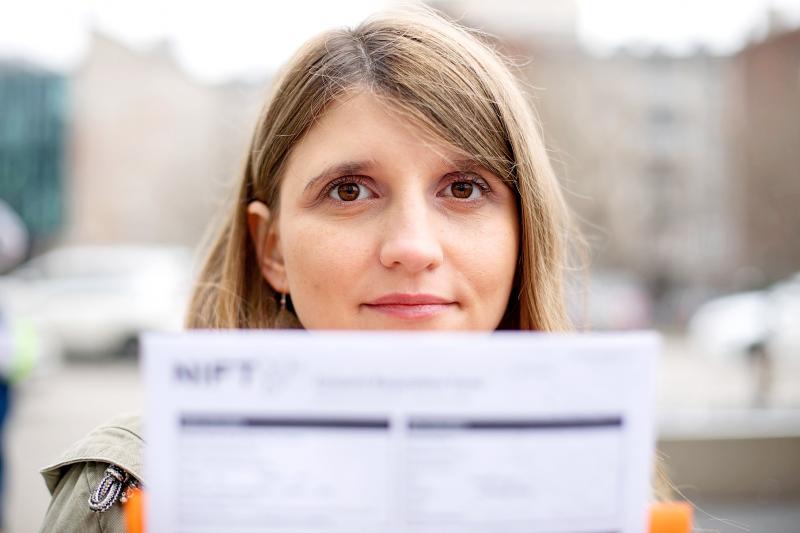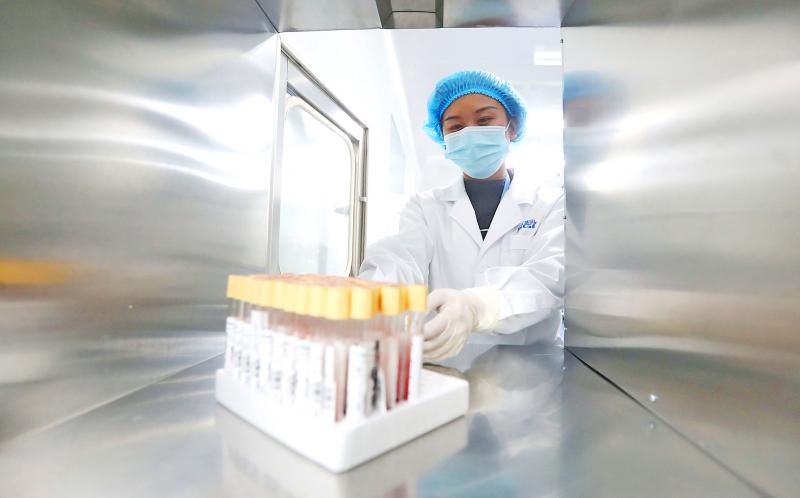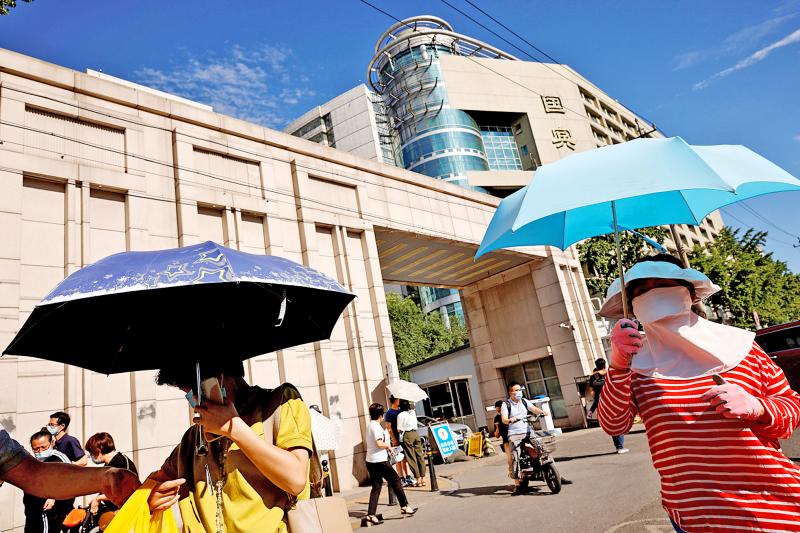A Chinese gene company selling prenatal tests around the world developed them in collaboration with the country’s military and is using them to collect genetic data from millions of women for sweeping research on the traits of populations, a review of scientific papers and company statements found.
US government advisers warned in March that a vast bank of genomic data that the company, BGI Group, is amassing and analyzing with artificial intelligence could give China a path to economic and military advantage. As science pinpoints new links between genes and human traits, access to the biggest, most diverse set of human genomes is a strategic edge. The technology could propel China to dominate global pharmaceuticals, and also potentially lead to genetically enhanced soldiers, or engineered pathogens to target the US population or food supply, the advisers said.
BGI’s prenatal test, one of the most popular in the world, is a source of genetic data for the company, which has worked with the Chinese military to improve “population quality” and on genetic research to combat hearing loss and altitude sickness in soldiers.

Photo: Reuters
BGI says it stores and re-analyses left-over blood samples and genetic data from the prenatal tests, sold in at least 52 countries to detect abnormalities such as Down’s syndrome in the fetus. The tests — branded NIFTY for “Non-Invasive Fetal TrisomY” — also capture genetic information about the mother, as well as personal details such as her country, height and weight, but not her name, BGI computer code shows.
So far, more than 8 million women have taken BGI’s prenatal tests globally. BGI has not said how many of the women took the test abroad, and said it only stores location data on women in China.
The tests are a private procedure for the women who take them, a component in their routine prenatal care. But the studies show that they yield increasingly potent information for research.

Photo: Reuters
One BGI study, for instance, used a military supercomputer to re-analyse NIFTY data and map the prevalence of viruses in Chinese women, look for indicators of mental illness in them and single out Tibetan and Uyghur minorities to find links between their genes and their characteristics.
The scale of BGI’s accumulation of prenatal data, and its collaboration with the military in prenatal and neonatal research, have not been previously reported. The company has published at least a dozen joint studies on the tests with the People’s Liberation Army (PLA) since 2010, trialling and improving the tests or analyzing the data they provided.
DNA data collected from prenatal tests on women outside China has also been stored in China’s government-funded gene database, one of the world’s largest, the company confirmed. BGI, in which the Shenzhen city government and Beijing’s largest state investment vehicle took stakes in 2014, runs that gene bank.

Photo: Reuters
No evidence has been found to show that BGI violated patient privacy agreements or regulations. However, the privacy policy on the NIFTY test’s Web site says data collected can be shared when it is “directly relevant to national security or national defense security” in China.
Beijing made clear in a 2019 regulation that genetic data can be a national security matter, and since 2015 it has restricted foreign researchers from accessing gene data on Chinese people. In contrast, the US and Britain give foreign researchers access to genetic data, as part of open science policies.
BGI said in a statement it “has never been asked to provide — nor provided — data from its NIFTY tests to Chinese authorities for national security or national defense security purposes.”
Other companies selling such prenatal tests also re-use data for research. But none operate on the scale of BGI, scientists and ethicists say, or have BGI’s links to a government or its track record with a national military.
INTERNATIONAL SCRUTINY
News BGI developed the prenatal tests with the PLA comes as international scrutiny is increasing over China’s use of civilian technology for military modernization. NATO has warned China’s assertive behavior is a systemic challenge, and Beijing has drawn sanctions for alleged human rights violations in Xinjiang and stepped up a national security crackdown in Hong Kong.
The findings offer new insight into how BGI is using vast computing power to unlock genomic secrets. Previously, Reuters revealed how the company rapidly expanded its gene-sequencing labs globally and gained a role in other nations’ health systems, and how it worked with China’s military on research ranging from mass testing for respiratory pathogens to brain science.
The examination also sheds new light on concerns expressed by a US expert panel, the US National Security Commission on Artificial Intelligence (NSCAI), led by former Google chief executive Eric Schmidt. The panel said in March that the US should recognize China’s strides towards global leadership in biotechnology and AI as a new kind of national security threat, and boost funding for its own research to counter China’s state-driven effort.
China’s Ministry of Foreign Affairs said the reporting in this article reflected “groundless accusations and smears” of US agencies. The PLA did not respond. China has released new privacy and data security laws that offer greater protection of personal data, but also allow Chinese national security authorities to access that data.
BGI did not respond to questions on its military collaboration or the national security threats that the US says its research poses.
“At no stage throughout the testing or research process does BGI have access to any identifiable personal data or the ability to match that data with personal records,” the company said.
Signed consent is obtained in advance, BGI said, and its data privacy protocols meet strict international standards.
A 2016 Chinese regulation requires samples and genetic sequences from the tests on Chinese women to be kept for at least three years, after which the women can request that the data is deleted. For women overseas, BGI said it destroys samples and deletes paper records and electronic data after a maximum of five years.
Some of BGI’s research has medical benefits, and BGI has cut the cost of gene sequencing so more universities, companies and hospitals worldwide can access sequencing technology, a key driver in the growing field of genomics. Genetics is the study of individual genes; genomics looks at all of a person’s genes, including how they interact with each other and the environment.
“Whilst BGI is a Chinese-based company, we consider ourselves part of the global race towards ending the COVID-19 pandemic and a key international contributor to the advancement of public health outcomes around the world,” the company said, adding it collaborates with a large number of academic and research organizations not just in China, but also the US, UK and Europe.
‘GO GLOBAL’
BGI is one of about half a dozen major providers of the tests, more generally known as non-invasive prenatal tests (NIPT), which women take about 10 weeks into a pregnancy to capture DNA from the placenta in the woman’s bloodstream. Its tests are marketed in at least 13 European Union countries, including Germany, Spain and Denmark, as well as in Britain, Canada, Australia, Thailand, India and Pakistan. They are not sold in the US.
However, the company is a pivotal player in a genomics race between China and the US. In its latest annual report, it said it “has been working hard to promote Chinese technology, Chinese experience and Chinese standards to ‘go global.’”
BGI grew as a result of Chinese government policies, said Anna Puglisi, a senior fellow at Georgetown’s Center for Security and Emerging Technology, who worked until last year as the US government’s National Counterintelligence Officer for East Asia. “The Chinese state can really compel, in their national security law, companies to work with them,” she said, referring to a 2017 law requiring all Chinese organizations to assist national intelligence efforts.
Being able to understand how physical characteristics relate to a gene — and thus figuring out what genes actually do — “really is the cutting edge of genomics,” said Puglisi, who worked on biosecurity issues in the US government.
When you can combine large amounts of genomic data — including mothers and their unborn children — with their medical data and history, it is really powerful.”
The data offer insight into foreign populations as well as China’s own. Computer instructions that BGI uses to process the NIFTY data show it collects a wide range of information about customers besides their genetic code. This includes the women’s country, medical history and the sex of the fetus, according to the instructions, reviewed by Reuters on a programmers’ forum online.
More than 100 documents were reviewed, from research papers to marketing materials, to determine the scope of data being captured by BGI through its prenatal tests, how it is using this in its research and its military collaboration. More than two dozen scientists and experts in genetic law were interviewed, including researchers who worked with the company, as well as four women, in Poland, Spain and Thailand, who took the tests.
The women, who signed consent forms stating that their genetic data would be stored and used for research, said they did not realize their genetic information could end up in China. For example, one of them, a 32-year-old office administrator in Poland, signed a BGI form agreeing to have her sample sent to Hong Kong and her genetic data retained, but the form did not say where it would be held, or make clear that BGI’s headquarters and research base are in Shenzhen.
The woman, Emilia, spoke on the condition that only her first name be used. She said that if she had known that, and understood the extent of BGI’s secondary research, she would have chosen a different test.
“I want to know what is happening with such sensitive data about me, such as my genome and that of my child,” she said. “This could be a very important matter when choosing a test. For me it would be.”
It was also unclear to the other women where their data was stored.
‘MILITARY MEDICINE INNOVATION PROJECT’
BGI has worked with Chinese military researchers to study the genomes of fetuses and newborns since at least 2010, when it signed a research cooperation agreement with the People’s Liberation Army General Hospital in Beijing, a hospital document shows.
The hospital is at the forefront of Chinese genetic research on deafness, and its head of obstetrics, Lu Yanping, was developing a prenatal test for deafness and Down’s syndrome. In April 2011, Lu began a clinical trial of NIFTY with BGI on 3,000 women in the hospital clinic, a published study shows. Neither Lu nor the hospital responded to requests for comment.
In August 2010 BGI started work with another military institution, the Third Military Medical University in Chongqing. Liang Zhiqing, vice chairman of the PLA’s Institute of Obstetrics and Gynecology, and BGI researchers have published at least five joint studies based on data from women who took the test at the university’s prenatal clinic.
Liang’s work was funded by the Chinese government as a “Military Medicine Innovation Project,” and the samples were sequenced in a BGI “joint laboratory” at the university, according to a paper in the European Journal of Medical Genetics. Liang did not respond to a request for comment.
The university and BGI ran conferences on preventing birth defects and “improving population quality,” conference promotion shows. The PLA was closely involved in a foundation to prevent birth defects, led by a key figure in the implementation of China’s One Child Policy, from 2011.
A BGI executive was among the experts at its first meeting, which heard that “birth defects not only affect the health and quality of life of children, but also the quality of the country’s population and manpower.” A plan to promote screening for 48 genetic and metabolic diseases was approved.
As well as prenatal research, BGI has collaborated with the military hospitals on genetic research programs designed to enhance soldiers’ performance.
It worked with the PLA General Hospital to identify genes linked to hearing loss: The hospital uses stem cells and gene therapy in research on combating deafness in soldiers caused by weapons training, papers in military medical journals show.
And BGI published studies with the Third Military Medical University in Chongqing exploring whether drugs interacting with genes could protect Han Chinese, the country’s majority ethnic group, from brain injury at high altitudes. Those studies refer to soldiers stationed in Tibet and Xinjiang, high plateau regions which border India’s Ladakh, where fighting broke out last June.
‘AN UNTAPPED RESOURCE’
For more than a decade, scientists worldwide have searched for a cost-effective way to study the genetic profiles of a whole population of people. A handful of efforts reached tens of thousands of participants, but anything larger stalled on cost and logistics, BGI researchers wrote in a 2018 scientific paper published in Cell.
Left-over samples and test data from prenatal tests meant BGI could run studies on an unprecedented scale.
In the Cell paper, BGI researchers said they had performed the largest study of Chinese population genetics ever — which they undertook with 141,000 re-used prenatal tests. The tests, they said, “provide an untapped resource” to understand how people’s genes relate to their characteristics, and to their susceptibility to viruses.
This, they said, could offer “considerable mapping power.”
The researchers were also able to trace genetic distinctions between the country’s dominant Han Chinese ethnic group and minorities including Uyghurs and Tibetans, and look at population movements and intermarriage caused by Chinese government policy since 1949. This data was later released to other Chinese researchers studying how “significantly different” genetic variations in Uighurs affected their response to drugs, a 2019 scientific paper shows.
China’s collection and analysis of the DNA of its Uyghur Muslim population — including systematic collections of samples from residents in Xinjiang — has drawn sharp criticism. The US sanctioned two BGI subsidiaries last year for what it called China’s “abusive DNA collection and analysis schemes to repress its citizens.” BGI denied it was involved in any human rights abuses in Xinjiang. China’s foreign ministry said health check-ups of Uyghurs there did not collect biological information such as DNA.
UC Berkeley’s Nielsen told Reuters he no longer worked with BGI. He chose to end a decade-long collaboration soon after the 2018 study was published in Cell, because changes to Chinese law restricted foreign researchers working with Chinese genomic data, he said.
“Things are really changing in China,” Nielsen told Reuters. “Science used to be free.”

Jacques Poissant’s suffering stopped the day he asked his daughter if it would be “cowardly to ask to be helped to die.” The retired Canadian insurance adviser was 93, and “was wasting away” after a long battle with prostate cancer. “He no longer had any zest for life,” Josee Poissant said. Last year her mother made the same choice at 96 when she realized she would not be getting out of hospital. She died surrounded by her children and their partners listening to the music she loved. “She was at peace. She sang until she went to sleep.” Josee Poissant remembers it as a beautiful

Before the last section of the round-the-island railway was electrified, one old blue train still chugged back and forth between Pingtung County’s Fangliao (枋寮) and Taitung (台東) stations once a day. It was so slow, was so hot (it had no air conditioning) and covered such a short distance, that the low fare still failed to attract many riders. This relic of the past was finally retired when the South Link Line was fully electrified on Dec. 23, 2020. A wave of nostalgia surrounded the termination of the Ordinary Train service, as these train carriages had been in use for decades

Lori Sepich smoked for years and sometimes skipped taking her blood pressure medicine. But she never thought she’d have a heart attack. The possibility “just wasn’t registering with me,” said the 64-year-old from Memphis, Tennessee, who suffered two of them 13 years apart. She’s far from alone. More than 60 million women in the US live with cardiovascular disease, which includes heart disease as well as stroke, heart failure and atrial fibrillation. And despite the myth that heart attacks mostly strike men, women are vulnerable too. Overall in the US, 1 in 5 women dies of cardiovascular disease each year, 37,000 of them

Politically charged thriller One Battle After Another won six prizes, including best picture, at the British Academy Film Awards on Sunday, building momentum ahead of Hollywood’s Academy Awards next month. Blues-steeped vampire epic Sinners and gothic horror story Frankenstein won three awards each, while Shakespearean family tragedy Hamnet won two including best British film. One Battle After Another, Paul Thomas Anderson’s explosive film about a group of revolutionaries in chaotic conflict with the state, won awards for directing, adapted screenplay, cinematography and editing, as well as for Sean Penn’s supporting performance as an obsessed military officer. “This is very overwhelming and wonderful,” Anderson